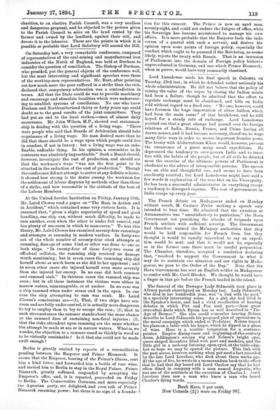On Saturday last, a very remarkable conference, composed of representatives
of the coal-mining and manufactured iron industries of the North of England, was held at Durham to consider the question of conciliation. The Bishop of Durham, who presided, put the general objects of the conference well, but the most interesting and significant speeches were those of the working-men representatives. Mr. Bart, after pointing out how much more the poor suffered in a strike than the rich, declared that compulsory arbitration was a contradiction in terms. All that the State could do was to provide machinery and encourage and stimulate localities which were endeavour- ing to establish systems of conciliation. No one who knew Durham and Northumberland thirty or forty years ago could doubt as to the good results of the joint committees. They had put an end to the local strikes,—once of almost daily -occurrence. Mr. John Wilson, M.P., showed real statesman- ship in dealing with the question of a living wage. "There were people who said that Boards of Arbitration should take cognisance of a living wage. No man desired more than he did that there should be a wage upon which people could live in comfort, if not in luxury ; but a living wage was an inde- finable, urfiirsble thing. In his opinion, a committee to fix -contracts was absolutely impracticable." Such a Board should, however, investigate the cost of production, and should see that the workmen's wage "was not the first point to be attacked in the reduction of the cost of production." Though the conference did not attempt to arrive at any definite scheme, it showed how strong is the desire among the workmen for the settlement of labour disputes by methods other than those of a strike, and how reasonable is the attitude of the best of the Labour Members.


















































 Previous page
Previous page